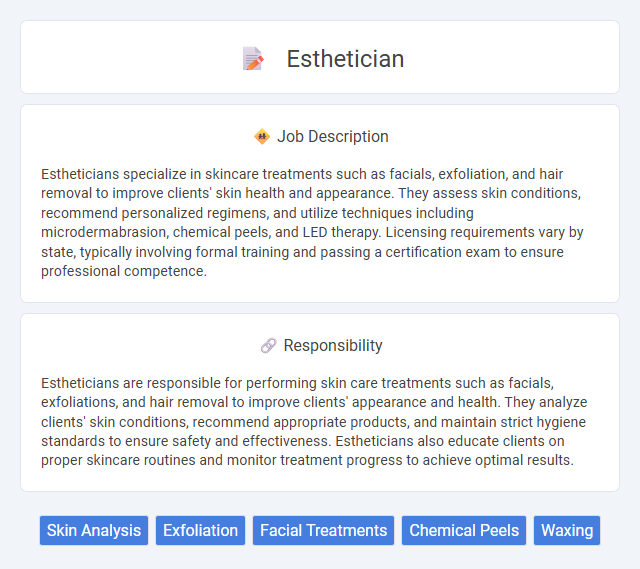
Estheticians specialize in skincare treatments such as facials, exfoliation, and hair removal to improve clients' skin health and appearance. They assess skin conditions, recommend personalized regimens, and utilize techniques including microdermabrasion, chemical peels, and LED therapy. Licensing requirements vary by state, typically involving formal training and passing a certification exam to ensure professional competence.
People with strong interpersonal skills and a genuine interest in skincare are likely suitable for a career as an esthetician. Those who handle stress well and have a patient, detail-oriented nature may find the job more rewarding. However, individuals sensitive to chemicals or those who prefer less physical interaction might be less suited for this profession.
Qualification
Estheticians typically require a state license, which involves completing a formal esthetics training program consisting of 300 to 600 hours of coursework in skin care, anatomy, and safety procedures. Candidates must pass both written and practical exams to demonstrate proficiency in treatments such as facials, hair removal, and skin analysis. Strong knowledge of dermatology, product ingredients, and sanitation standards ensures high-quality client care and compliance with health regulations.
Responsibility
Estheticians are responsible for performing skin care treatments such as facials, exfoliations, and hair removal to improve clients' appearance and health. They analyze clients' skin conditions, recommend appropriate products, and maintain strict hygiene standards to ensure safety and effectiveness. Estheticians also educate clients on proper skincare routines and monitor treatment progress to achieve optimal results.
Benefit
The esthetician job likely offers significant benefits, including opportunities for personal interaction and enhancing clients' confidence through skincare treatments. It probably provides flexible working hours and potential for growth in a thriving beauty industry. Most estheticians may also enjoy the satisfaction of helping others achieve healthier, more radiant skin.
Challenge
The esthetician job likely involves significant challenges related to staying updated with evolving skincare techniques and product innovations. There is a probability of encountering varying client skin conditions, which may require personalized treatment plans to achieve optimal results. Managing client expectations while ensuring safety and hygiene standards can also present ongoing professional challenges.
Career Advancement
Estheticians can advance their careers by gaining specialized certifications in areas like medical esthetics, laser treatments, and microdermabrasion, which increase their marketability and earning potential. Pursuing roles such as spa management, product development, or esthetic educator can further elevate professional growth and leadership opportunities. Continuous education and staying updated with industry trends are critical for career progression and establishing a reputable client base in the competitive beauty industry.
Key Terms
Skin Analysis
Skin analysis is a critical skill for estheticians, involving the detailed examination of skin type, texture, and conditions to create personalized treatment plans. Advanced techniques, such as digital imaging and magnification tools, enable precise identification of issues like acne, hyperpigmentation, or dehydration. Accurate skin analysis enhances client satisfaction by promoting targeted skincare regimens and improving overall treatment outcomes.
Exfoliation
Exfoliation is a fundamental skincare treatment performed by estheticians to remove dead skin cells and promote cellular renewal, enhancing skin texture and radiance. Professional exfoliation methods include chemical peels using alpha or beta hydroxy acids and physical techniques like microdermabrasion, both tailored to individual skin types. Effective exfoliation not only improves absorption of skincare products but also supports anti-aging benefits by stimulating collagen production and reducing hyperpigmentation.
Facial Treatments
Estheticians specializing in facial treatments provide skin analysis, deep cleansing, exfoliation, and customized mask applications to improve skin health and appearance. They utilize advanced techniques such as microdermabrasion, chemical peels, and LED light therapy to address concerns like acne, aging, and hyperpigmentation. Expertise in facial massage and product recommendations enhances therapeutic outcomes and client satisfaction.
Chemical Peels
Chemical peels are a fundamental service provided by estheticians to improve skin texture, tone, and overall appearance by removing dead outer layers of skin through controlled chemical exfoliation. Estheticians must have specialized training in selecting appropriate peel types--such as glycolic, salicylic, or lactic acid peels--based on client skin type and concerns to ensure safety and effectiveness. Mastery of post-treatment care protocols and client assessment is essential to minimize complications and achieve optimal, long-lasting results.
Waxing
An esthetician specializing in waxing provides professional hair removal services using various techniques such as strip and hard wax to ensure smooth, long-lasting results. Mastery in skin anatomy and product knowledge allows estheticians to minimize discomfort and prevent skin irritation during the waxing process. Waxing services offered by licensed estheticians contribute to improved skin texture and enhanced client confidence, making it a highly sought-after beauty treatment.
 kuljobs.com
kuljobs.com